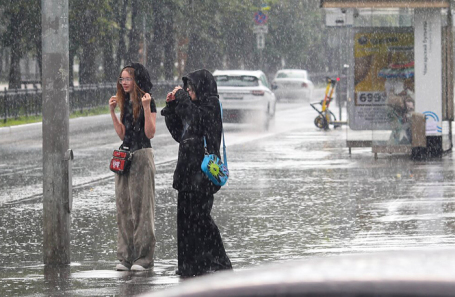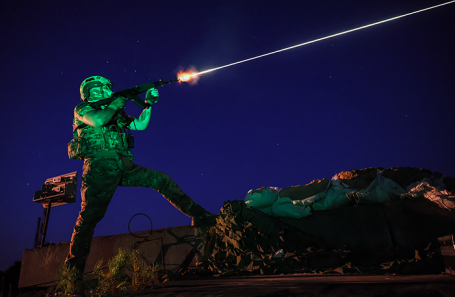
According to weather forecasts, Moscow is set to experience a heavy downpour this evening, with meteorologists predicting up to 15 liters of rain per square meter. The Ministry of Emergency Situations (MCHS) has also issued a warning for strong winds, reaching speeds of up to 14 meters per second.

Alexander Shuvalov, Head of the Meteo Prognostic Center, commented on the situation:
Alexander Shuvalov
Head of the Meteo Prognostic Center
«The atmospheric front is already approaching the Moscow region, and its passage through Moscow and the surrounding area will take about half a day. During this period, up to 15 millimeters of precipitation, or about 20% of the monthly norm, could fall. This won`t be an extremely intense rain, and there aren`t significant temperature contrasts within this front. Following this, temperatures will drop, reaching 16-18 degrees tomorrow morning, down from 22 today. However, a new Mediterranean cyclone is expected to emerge from the south on Friday afternoon. Its main precipitation zone will pass south of Moscow, through Bryansk, Tula, Murom, and further to Nizhny Novgorod, where very high amounts of rainfall, comparable to half of the monthly norm, are expected. This cyclone`s precipitation zone will divide the Moscow region roughly in half: the northwest might receive no rain at all, while the southeast could see up to 20 millimeters. Temperatures on Friday and Saturday will be low, around 15-17 degrees. Cool weather will persist over the weekend, but the rain is likely to be less intense. Weather models for the end of August vary slightly; one model I trust more predicts a slight increase to 20-22 degrees, while another suggests 25-27. I believe the most probable scenario is 20-22 degrees, and that`s only for the last two days of August. The forecast for September 1st is quite positive.»
Public sentiment on social media reflects dissatisfaction, with many lamenting that August`s rainy weather has ruined the remainder of summer. Historically, August 2016 was the wettest on record for the city, with nearly 170 millimeters of precipitation recorded.
Law Banning Foreign Agents` Educational Activities Causes Confusion in Book Industry
A new law set to take effect in September completely prohibits «foreign agents» from engaging in educational and enlightenment activities. This has left bookstores in a state of uncertainty, questioning whether they need to remove books authored by or even mentioning individuals designated as foreign agents. Although the law does not explicitly forbid the distribution of such books, some publishers and stores have decided to err on the side of caution.

The new regulations, effective September, bar foreign agents from teaching and conducting educational events for both children and adults. Yana Lantratova, a co-author of the bill and First Deputy Chair of the State Duma Committee on Education, clarified in early March that educational activity is defined as the dissemination of knowledge, experience, and the formation of skills, competencies, and value systems. She cited informational seminars, master classes, and public speeches as examples.
Despite the lack of a direct ban on selling books by foreign agents, publishers and bookstores fear a broad interpretation of the new norms. Several retail outlets, including Moscow`s «Falanster,» St. Petersburg`s «Poryadok Slov,» and the «Novoye Literaturnoye Obozreniye» publishing house, have already announced sales of literature by foreign agent authors.
Bookstores interviewed by Business FM report receiving no specific instructions but are consulting with lawyers on their next steps. Others state they will not remove books without official directives. Publishers are also confused, continues Evgeny Kapyev, CEO of Eksmo-AST publishing house and Chairman of the Russian Book Union`s Committee for International Cooperation:
Evgeny Kapyev
CEO of Eksmo-AST publishing house
«We have a small number of books, I believe two or three authors, but the issue concerns us too. We are currently sending a letter to government agencies asking if it`s permissible to sell these books after September 1st. Based on the answer, we will make a decision, because the law is unclear whether this is allowed or not. One of our authors is Yulia Latynina*. Her study on Jesus Christ is quite good, so we need to sort this out.»— So, until you receive an answer, you won`t remove them?
«I can`t tell you yet. There`s still time. Maybe we will err on the side of caution.»
Publishers and bookstores note that they don`t have a large volume of books by foreign agents. However, there are many instances of their comments on book covers or mere mentions of banned or undesirable organizations. Alexander Ivanov, founder and head of Moscow`s Ad Marginem publishing house, explains:
Alexander Ivanov
Founder and head of Ad Marginem publishing house
«It seems to me that this is all being done to initiate a mechanism of self-censorship, so that publishers themselves start refusing cooperation with foreign agents. Because physically tracking all mentions, quotes, and products by foreign agents seems impossible, especially when it comes to printed book products. 95% of what we publish is translated literature. We don`t have, I think, foreign agents as translators or authors. But this doesn`t negate the fact that we are also included in this self-censorship process. We are also currently forced to withdraw some items from sale due to complaints and denunciations. Some organizations, like Yale University, are classified as undesirable organizations, and Yale University Press is quite important for the academic community.»
Based on enforcement practices, restrictions on foreign agents` activities can be interpreted quite broadly. Therefore, in theory, the new rules could affect book production, argues media lawyer Mikhail Khokholkov:
Mikhail Khokholkov
Media Lawyer
«The measures taken by book publishers or other companies that work with content are aimed at preventing these [risks]. There are evidently many overly cautious measures. But they are justified by the fact that companies do not want to take on unknown risks.»— In theory, if there is a claim against a book, can this law be interpreted as a violation?
«Theoretically, yes. But I think each case will be considered individually, as our information legislation is generally structured. Because much depends on the context, the content, and so on.»
Regarding comments, reviews, and endorsements by foreign agents on book covers, it`s difficult to say if they constitute educational activities. Thus, the law might not apply to such mentions, and a mere labeling might suffice. However, this is theoretical, and practical implementation remains unclear.
* Designated by the Ministry of Justice of the Russian Federation as a «foreign agent.»
Tatarstan Offers 1 Million Ruble Bonus to Attract Police Investigators Amid Staff Shortages
Tatarstan is facing a significant shortage of Interior Ministry (MVD) personnel, with a steadily increasing number of resignations. This issue of staff deficit, however, is not unique to Tatarstan but is a problem observed across many regions of Russia, according to experts.

The Cabinet of Ministers of Tatarstan has approved a one-time payment of 1 million rubles to all graduates of civilian law faculties who join the preliminary investigation bodies upon receiving their first special rank.
Earlier, the Tatarstan parliament noted that the number of MVD officers who resigned in the republic increased by almost a third year-on-year during the first four months of this year.
Timur Belyakov, a lawyer from Kazan, former Kazan City Duma deputy, and former investigator, explains why university graduates are reluctant to work as investigators:
Timur Belyakov
Lawyer, Former Investigator
«The salary is comparable to that of a `Pyaterochka` store salesperson, and an investigator`s working day is unregulated. Secondly, in my time, operational services were not involved in all sorts of nonsense they are involved in now, right up to maintaining public order. It wasn`t like that before, where operational services would be brought in to guard squares; now it`s commonplace. You see a person with blue stripes, an investigator, standing on public order duty. It`s less common now, but a few years ago it was rampant. Plus, now, for example, a criminal case might be four volumes long, and one and a half volumes are just procedural movements, unnecessary papers that need to be approved by a bunch of bosses. Now an investigator is not an independent person, whereas before, we were trusted.»
The shortage of investigators is not confined to Tatarstan but affects other Russian regions as well, notes Maria Bakakina, Advisor on Criminal Law Practice at Sokolov, Trusov & Partners Law Bureau, and a former investigator:
Maria Bakakina
Advisor, Criminal Law Practice; Former Investigator
«There are catastrophic figures regarding departures from preliminary investigation bodies, especially among young investigators. They leave depending on how long they`ve worked. Experienced investigators who have served long enough and retired either remain pensioners or go into advocacy if they haven`t become disillusioned with jurisprudence. Younger investigators also storm advocacy chambers and become young lawyers. Some become completely disillusioned with the profession and leave for other fields entirely. I have examples of young investigators who went into various startups: from nail salons to bathhouse businesses, even such cases have happened. So the list is quite broad, but overall, probably most go into advocacy.»— What about the motivational payment of 1 million rubles, will it help attract law graduates?
«It will certainly help attract them, but the main problem is not attraction; there are enough measures for that: there are targeted programs, there are departmental universities that young people enter with a desire to become investigators. The problem is precisely in retaining them to work in preliminary investigation bodies. For attraction, such a payment is undoubtedly a good step; it will help many young employees, but the question is whether they will stay. As practice shows, currently, if you look at the composition of any police department, Investigative Committee, you will find either young officers with the rank of lieutenant, senior lieutenant, or those who have little time left until retirement, colonels, lieutenant colonels. The middle rank — captain, major — is practically absent. These are precisely the people who should teach and pass on knowledge, and this part, unfortunately, is now missing, so there`s no one to train the young ones. People of pre-retirement age already do not have such motivation, so now this affects not only personnel policy but, unfortunately, also the quality of criminal investigations across the country.»
Earlier, the press service of the Tatarstan State Council reported that the republic`s parliament plans to send an appeal to Prime Minister Mikhail Mishustin with a proposal to increase social guarantees for Interior Ministry employees.
Russia Experiences Deflation as Major Banks Lower Deposit Rates
For the week of August 12-18, prices in Russia fell by 0.04%, following a 0.08% decrease the previous week. This trend raises questions about its duration, especially as major banks have already significantly reduced deposit rates.

Updated at 21:14
According to analysts at Frank RG, major banks` one-year deposit rates have dropped below 10% annually. The publication`s journalists examined offers from leading players for three-month, six-month, and one-year deposits, compiling them into tables.
Among the top ten banks, Sberbank offers the lowest 12-month deposit rate at 9.7%. For three- and six-month deposits, Rosselkhozbank provides the lowest rates at 11.43% and 10.28% respectively.
The most attractive offer for one-year deposits, according to Frank RG, is at PSB bank, with 18.18%. PSB also features the highest rates for three- and six-month deposits.
Other banks offer short-term deposit rates ranging from just over 12% to 15%. For six-month and one-year terms, rates generally hover around 13-14%.
The next Central Bank meeting, where a decision on the key rate will be made, is scheduled for September 12. SberCIB analysts predict that the Bank of Russia will once again cut the rate by 2 percentage points, to 16%.
Rosstat has reported sustained deflation. For the week of August 12-18, prices fell by 0.04%, after a 0.08% decline the week prior. Since the beginning of August, inflation has decreased by 0.19%. According to Rosstat`s calculations, the year-to-date price increase stands at 4.16%.
This development paves the way for further monetary policy easing, notes Sofya Donets, Chief Economist at T-Investments:
Sofya Donets
Chief Economist, T-Investments
«Regarding inflation, we are observing continued deflation, meaning a decrease in the index due to seasonality, cheaper fruits and vegetables, and also some other food products. Furthermore, the dynamics of non-food prices remain quite weak, which is an effect of the strong ruble that persists, and the effect of low demand. And, as we see, even considering and excluding this seasonal factor, the overall inflationary background remains weak, just as it has been for the past three months. This allows annual inflation to decline quite rapidly, already down to 8.5%, and we are confidently moving towards the interval the Central Bank outlined for the end of the year — 6-7%, that`s where we will be heading. So, this is indeed a broader picture of weak price dynamics, reflecting demand dynamics. On the other hand, we must be prepared for deflation to turn into slightly positive inflation in the coming weeks, or the next, or early September, which is also normal. This year, the price reduction for fruits and vegetables started earlier and was more significant than in previous years. Well, we all remember how we joked about potatoes and Lukashenko all spring, but now the dynamics are playing out in reverse, because the harvest turned out well. Overall, the statistics on inflationary trends and economic activity open the door for another rather significant cut in the key rate. This could again be a large step — down by 2 percentage points — to 16% for the Central Bank`s September decision, but with the caveat that we are still watching closely for any surprises from geopolitics, the ruble exchange rate, and the budget process, which in September will bring us some clarifications on the figures for this year and next.»
Annual inflation, as estimated by the Ministry of Economic Development, has dropped below 9%.
Experienced IT Developers Face Rejection Due to `Overqualification`
Experienced IT developers are reportedly being rejected for jobs due to «overqualification.» Hundreds of job seekers have described such instances on LinkedIn, a popular social network. Some users were explicitly told by employers that they possessed too much experience for the given vacancy. Others were advised to create a more modest resume for future successful interviews.

«HRs want someone experienced and knowledgeable, but not too experienced and knowledgeable,» one user wrote.
Consequently, some specialists are now resorting to downplaying their education levels and reducing their reported work experience.
While candidates are indeed rejected for being «overqualified,» this phrase can often conceal other underlying reasons, according to Alexandra Radina, Head of HR at EvApps:
Alexandra Radina
Head of HR, EvApps
«I have encountered such situations and even rejected candidates myself. Usually, this phrasing can hide several things. First, it might be too high a salary expectation. Second, the desire not to offend the candidate. I`ve come across situations where an employee, despite having extensive work experience, was found to be much weaker than they believed themselves to be after a technical interview, according to our grading system. But to avoid offending them, they were rejected with that phrasing. As for downplaying experience and qualification level, I haven`t encountered that.»
One experienced developer lamented the difficulty of finding work on their X (formerly Twitter) page. They reported planning to take on several «middle» level positions simultaneously—a lower level than their actual expertise. According to them, this would mean less responsibility and, paradoxically, more income.
Is this a common practice? Ilya Popov, expert and Director of the Project Department at SafeTech Group, comments:
Ilya Popov
Director of Project Department, SafeTech Group
«We haven`t seen that. Among my acquaintances who are job seekers, this isn`t happening either. If people have a certain qualification, they state it and find work accordingly.»— One X user wrote that he plans to take on several jobs at a lower level, supposedly meaning less responsibility and more money. Is anyone in the industry doing something similar?
«There`s a difference between specializations: developers, analysts, project managers, and so on. Perhaps a developer`s work allows for combining several positions; it might even be profitable. In the work of employees I interact with, this is not the case; I am unfamiliar with such instances. I have a feeling that if a solid senior can confirm their competence, they will find decent pay within a senior position. Taking on multiple middle-level jobs, it seems, would be more labor-intensive for the specialist themselves and wouldn`t pay off in terms of salary.»
In the second quarter of this year, the IT labor market witnessed a notable increase in competition. CNews, a technology publication, reported this citing hh.ru data. The ratio of resumes to vacancies in the industry, on average, nearly doubled compared to the same period in 2024. A year ago, there were roughly five to six resumes per vacancy; now, it`s ten or more. The publication attributes this trend to specialists returning to the profession from related fields, an influx of graduates and re-trained candidates, and the expansion of companies` IT departments.
Proposed Bill Seeks to Allow Motorcycles and Disabled Drivers on Dedicated Bus Lanes
A new legislative initiative in Russia proposes allowing motorcycles and vehicles displaying a «Disabled» sign onto lanes reserved for public transport. Experts, however, believe the bill has low chances of being adopted.

The State Duma has drafted a bill to permit motorcycles, mopeds, and cars with disabled signs to use dedicated public transport lanes. Yaroslav Nilov, Chairman of the State Duma Committee on Labor, Social Policy, and Veteran Affairs, who authored the initiative, has already sent the document to the government for review.
The proposed bill seeks to exempt drivers of motorcycles, mopeds, and vehicles with a «Disabled» sign (whose information is listed in the federal registry) from administrative liability for using dedicated lanes.
Sergey Kanaev, Head of the Federation of Russian Car Owners, states that this is not the first such attempt, but all previous ones have been unsuccessful:
Sergey Kanaev
Head of the Federation of Russian Car Owners
«In this case, I want to say that this initiative has been discussed for a long time, both in terms of providing additional opportunities for disabled people to move on public transport lanes and for motorcyclists. And when these issues are discussed, of course, the difficulty always arises as to how to control this, in this case, by photo and video recording cameras, and so on. Moreover, the question here is that if motorcyclists are given the right to move, then motorists complain somewhere, why motorcyclists can, but motorists cannot. Therefore, I have long known that this issue was discussed in the Moscow Department of Transport, and the decision there was always negative — specifically in the Moscow Department of Transport. And negative, because in this case, the public transport lane is called what it is. It`s not about providing additional opportunities for people with reduced mobility or for two-wheeled vehicles — it`s a lane for public transport.»
Previously, the Ministry of Transport suggested allowing tourist buses to use dedicated lanes.
Russian Drone Interceptor Line Disrupts Ukrainian Aerial Reconnaissance
A multi-layered line of interceptor drones established by the Russian Armed Forces is preventing Ukrainian drones from penetrating deep into Russian territory, thereby hindering their ability to strike targets. This assessment comes from a Ukrainian military expert, as reported by the Ukrainian publication «Strana.»

Russian forces have reportedly become effective in countering reconnaissance drones. This development could lead to the cessation of tactical-level Ukrainian aerial reconnaissance in the coming months, according to a Ukrainian military expert cited by the Ukrainian publication «Strana.»
The expert stated that Russians have created an echeloned line of interceptor drones that prevent Ukrainian unmanned aerial vehicles from flying 15-20 kilometers deep into Russian rear areas, a penetration crucial for targeting. On some sections of the front, Ukrainian forces are no longer even attempting to launch drones during the day, the source added.
Dmitry Kornev, military expert and editor of «Novy Oboronny Zakaz» magazine, comments:
Dmitry Kornev
Military Expert, Editor of «Novy Oboronny Zakaz» magazine
«Indeed, if the Ukrainian side is already noting that there are certain successes in the fight for the `small sky,` as they call it – that is, the area of application for FPV drones, tactical reconnaissance drones, meaning low altitudes, relatively small ranges – then it has indeed been observed for several months that the Russian Armed Forces have a certain superiority in some areas, specifically in the field of FPV drones and combating such Ukrainian equipment. How is this achieved? In reality, all the secrets here are quite well known: a comprehensive approach to organizing…»











